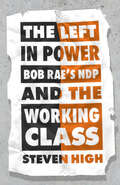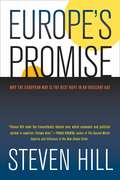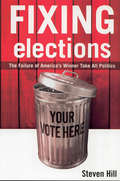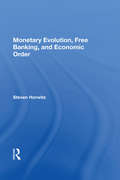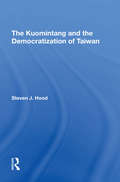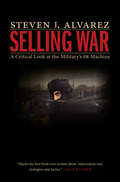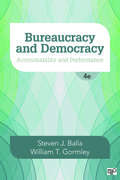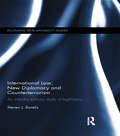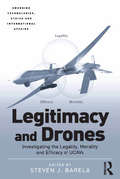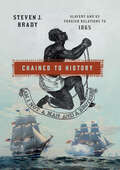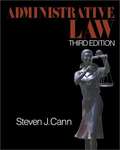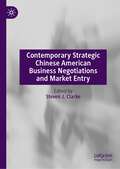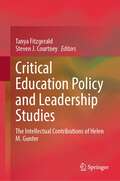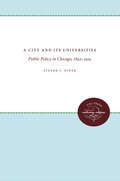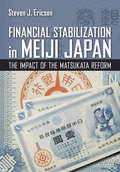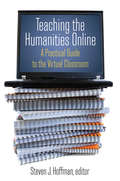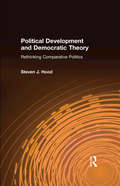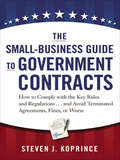- Table View
- List View
The Left in Power: Bob Rae’s NDP and the Working Class
by Steven HighAt the end of the twentieth century, as social democratic parties around the world struggled to produce a coherent response to the deindustrialization crisis, many pivoted towards progressive neoliberalism and Third Way social democracy. Almost everywhere, they turned their backs on the weakened trade union movement and embraced neoliberal assumptions about labour force flexibility and global competition. Shamefully, Third Way social democrats emphasized the moral dimension of poverty rather than its structural causes as they abandoned the old redistributive class politics of the Left. Based on extensive archival research and interviews with NDP politicians, senior economic policy advisors, and trade unionists, The Left in Power examines the response of the political Left in Ontario to the crisis that gripped the old ‘industrialized world.’ Steven High revisits the heartbreaking years of Bob Rae’s Ontario NDP government—from their historic and unexpected 1990 victory, to their policy shifts that left working-class voters feeling betrayed, to their landslide defeat in 1995—to uncover what we can learn from one social democratic party’s mistakes about how to govern from the Left.
Europe’s Promise
by Steven HillA quiet revolution has been occurring in post-World War II Europe. A world power has emerged across the Atlantic that is recrafting the rules for how a modern society should provide economic security, environmental sustainability, and global stability. In Europe's Promise, Steven Hill explains Europe's bold new vision. For a decade Hill traveled widely to understand this uniquely European way of life. He shatters myths and shows how Europe's leadership manifests in five major areas: economic strength, with Europe now the world's wealthiest trading bloc, nearly as large as the U.S. and China combined; the best health care and other workfare supports for families and individuals; widespread use of renewable energy technologies and conservation; the world's most advanced democracies; and regional networks of trade, foreign aid, and investment that link one-third of the world to the European Union. Europe's Promise masterfully conveys how Europe has taken the lead in this make-or-break century challenged by a worldwide economic crisis and global warming.
Expand Social Security Now!
by Steven HillWhy Social Security is not only sustainable but should be substantially expandedSocial Security is bankrupting us. It's outdated. It's a Ponzi scheme. It's stealing from young people. These are some of the biggest myths and lies about one of the most successful programs in our nation's history. Three-quarters of Americans depend heavily on Social Security in their elderly years and nearly half would be living in poverty without it. But as important and popular as it is, Social Security has become a political football. A well-financed campaign--supported by conservatives, special interest groups, and even leading Democrats--has lobbied for cuts and significant "entitlement reform," falsely proclaiming that Social Security is going broke. Policy expert Steven Hill argues that Social Security should not only be defended, it should be substantially expanded. Here he proposes how we can double the monthly benefit and how to pay for it by closing many of the tax loopholes and deductions that disproportionately favor the wealthy few.From the Trade Paperback edition.
Fixing Elections: The Failure of America's Winner Take All Politics
by Steven HillFixing Elections shows our whole 18th-century Winner Take All political system, including the way we elect our legislatures. Steven Hill argues our geographic-based, Winner Take All political system is at the root of many of our worst political problems, including poor minority and majority representation, low voter turnout, expensive mudslinging campaigns, congressional gridlock, regional balkanization, and the growing divide between city-dwellers and middle-America.
Raw Deal: How the "Uber Economy" and Runaway Capitalism Are Screwing American Workers
by Steven Hill"What's going to happen to my job?"That's what an increasing number of anxious Americans are asking themselves. The US workforce, which has been one of the most productive and wealthiest in the world, is undergoing an alarming transformation. Increasing numbers of workers find themselves on shaky ground, turned into freelancers, temps and contractors. Even many full-time and professional jobs are experiencing this precarious shift. Within a decade, a near-majority of the 145 million employed Americans will be impacted. Add to that the steamroller of automation, robots and artificial intelligence already replacing millions of workers and projected to "obsolesce" millions more, and the jobs picture starts looking grim. Now a weird yet historic mash-up of Silicon Valley technology and Wall Street greed is thrusting upon us the latest economic fraud: the so-called "sharing economy," with companies like Uber, Airbnb and TaskRabbit allegedly "liberating workers" to become "independent" and "their own CEOs," hiring themselves out for ever-smaller jobs and wages while the companies profit. But this "share the crumbs" economy is just the tip of a looming iceberg that the middle class is drifting toward. Raw Deal: How the "Uber Economy" and Runaway Capitalism Are Screwing American Workers,by veteran journalist Steven Hill, is an exposé that challenges conventional thinking, and the hype celebrating this new economy, by showing why the vision of the "techno sapien" leaders and their Ayn Rand libertarianism is a dead end. In Raw Deal, Steven Hill proposes pragmatic policy solutions to transform the US economy and its safety net and social contract, launching a new kind of deal to restore power back into the hands of American workers.
The Palgrave Fichte Handbook (Palgrave Handbooks in German Idealism)
by Steven HoeltzelThis Handbook provides a comprehensive single-volume treatment of Fichte’s philosophy. In addition to offering new researchers an authoritative introduction and orientation to Fichtean thought, the volume also surveys the main scholarly and philosophical controversies regarding Fichtean interpretation, and defends a range of philosophical theses in a way that advances the scholarly discussion. Fichte is the first major philosopher in the post-Kantian tradition and the first of the great German Idealists, but he was no mere epigone of Kant or precursor to Hegel. His work speaks powerfully and originally to a wide range of issues of enduring concern, and his many innovations importantly anticipate major developments, including absolute idealism, phenomenology, and existentialism. He is therefore not only a path-breaking thinker but also a pivotal figure in Western intellectual history. Wide-ranging, well-organised and timely, this key volume makes Fichte’s work both accessible and relevant. It is essential reading for scholars, graduate researchers and advanced students interested in Fichte, German Idealism, and the history of nineteenth-century philosophy in the West.
Monetary Evolution, Free Banking, And Economic Order
by Steven HorwitzThis book deals with the origin and functions of money and banking, emphasizing the role both play in the promotion of economic order. Developing the insights of Hayek and others of the Austrian tradition, Professor Horwitz argues that an appreciation of the spontaneous evolutionary processes that produce and maintain our monetary institutions shou
Handbook of Giftedness in Children: Psychoeducational Theory, Research, and Best Practices
by Steven I. PfeifferIn one comprehensive resource, this superb handbook covers everything you need to know about the subject. It brings together leading experts from the fields of psychology and education, combining theory and applied empirical research on such crucial topics as conceptualization, types of intelligence, developmental considerations, and ethical and legal concerns. Particular attention is given to social and family contexts, and evidence-based strategies and interventions offer solid guidelines on assessment, curriculum design, and encouraging and nurturing talent – from preschool through adolescence.
The Kuomintang And The Democratization Of Taiwan
by Steven J HoodIs the Kuomintang - the nationalist party of China - the villain it is sometimes portrayed to be? Or is it the embodiment of the political and moral good that partisans have claimed it to be? The party has managed a feat of economic modernization in Taiwan and has become a proponent of democracy, yet its reputation has been marred by brutal acts of repression and ineptitude. Focusing on the role of Kuomintang party elites in the democratization process in Taiwan, this book considers the Kuomintang's evolution from a Leninist state party to a fractious one in a competitive political system.
Selling War: A Critical Look at the Military's PR Machine
by Steven J. AlvarezIn the spring of 2004, army reservist and public affairs officer Steven J. Alvarez waited to be called up as the U.S. military stormed Baghdad and deposed Saddam Hussein. But soon after President Bush’s famous PR stunt in which an aircraft carrier displayed the banner “Mission Accomplished,” the dynamics of the war shifted. Selling War recounts how the U.S. military lost the information war in Iraq by engaging the wrong audiences—that is, the Western media—by ignoring Iraqi citizens and the wider Arab population, and by paying mere lip service to the directive to “Put an Iraqi face on everything.” In the absence of effective communication from the U.S. military, the information void was swiftly filled by Al Qaeda and, eventually, ISIS. As a result, efforts to create and maintain a successful, stable country were complicated and eventually frustrated. Alvarez couples his experiences as a public affairs officer in Iraq with extensive research on communication and government relations to expose why communications failed and led to the breakdown on the ground. A revealing glimpse into the inner workings of the military’s PR machine, where personnel become stewards of presidential legacies and keepers of flawed policies, Selling War provides a critical review of the outdated communication strategies executed in Iraq. Alvarez’s candid account demonstrates how a fundamental lack of understanding about how to wage an information war has led to the conditions we face now: the rise of ISIS and the return of U.S. forces to Iraq.
Bureaucracy and Democracy: Accountability and Performance (Controversies In Science Ser. #No. 65)
by William T. Gormley Steven J. BallaGiven the influence of public bureaucracies in policymaking and implementation, Steven J. Balla and William T. Gormley assess their performance using four key perspectives—bounded rationality, principal-agent theory, interest group mobilization, and network theory—to help students develop an analytic framework for evaluating bureaucratic accountability. The new Fourth Edition of Bureaucracy and Democracy: Accountability and Performance provides a thorough review of bureaucracy during the Obama and Trump administrations, as well as new attention to state and local level examples and the role of bureaucratic values. ? New to this Edition: Interviews with two new cabinet secretaries—Christine Todd Whitman and Tom Ridge—with insightful quotes from them throughout the book. Added material on the battle over regulations, a battle that will loom large during the Trump administration, including midnight regulations and the Congressional Review Act. New examples demonstrate the activity and influence of constituencies of different kinds including the placing of women and minorities on US currency, a vignette that features the musical Hamilton, and the political protests surrounding the Dakota Access and Keystone XL pipelines. A new discussion of the privatization of roads, the pros and cons.
Bureaucracy and Democracy: Accountability and Performance (Controversies In Science Ser. #No. 65)
by William T. Gormley Steven J. BallaGiven the influence of public bureaucracies in policymaking and implementation, Steven J. Balla and William T. Gormley assess their performance using four key perspectives—bounded rationality, principal-agent theory, interest group mobilization, and network theory—to help students develop an analytic framework for evaluating bureaucratic accountability. The new Fourth Edition of Bureaucracy and Democracy: Accountability and Performance provides a thorough review of bureaucracy during the Obama and Trump administrations, as well as new attention to state and local level examples and the role of bureaucratic values. ? New to this Edition: Interviews with two new cabinet secretaries—Christine Todd Whitman and Tom Ridge—with insightful quotes from them throughout the book. Added material on the battle over regulations, a battle that will loom large during the Trump administration, including midnight regulations and the Congressional Review Act. New examples demonstrate the activity and influence of constituencies of different kinds including the placing of women and minorities on US currency, a vignette that features the musical Hamilton, and the political protests surrounding the Dakota Access and Keystone XL pipelines. A new discussion of the privatization of roads, the pros and cons.
International Law, New Diplomacy and Counterterrorism: An interdisciplinary study of legitimacy (Routledge New Diplomacy Studies)
by Steven J. BarelaThis interdisciplinary book explores how terrorism is meant to target a government’s legitimacy, and advocates for sounder defensive measures when countering international attacks. The dramatic increase in global cooperation throughout the twentieth century—between international organisations and their state missions of diplomats, foreign officers, international civil servants, intelligence officers, military personnel, police investigators, judges, legislators, and financial regulators—has had a bearing on the shape and content of the domestic political order. The rules that govern all of these interactions, and the diplomats engaged to monitor and advocate for compliance, have undergone a mushrooming development following the conclusion of each world war. This dramatic growth is arguably the most significant change the international structure has experienced since the inception of the state-based system ushered in with the Peace of Westphalia in 1648. International Law, New Diplomacy and Counterterrorism explores the impact of this growth on domestic legitimacy through the integration of two disciplines: international law and political philosophy. Focusing particularly on the cross-border counterterrorism actions launched by the United States, the author investigates how civil societies have often turned to the standards of international law to understand and judge the legitimacy of their government’s counterterrorism policies reaching across international borders. The book concludes that those who craft counterterrorism policies must be attentive to defending the target of legitimacy by being wholly mindful of the realms of legality, morality and efficacy when exercising force. This book will be of much interest to students of international law, diplomacy, counterterrorism, political philosophy, security studies and IR.
Legitimacy and Drones: Investigating the Legality, Morality and Efficacy of UCAVs (Emerging Technologies, Ethics and International Affairs)
by Steven J. BarelaUnmanned combat air vehicles, or in common parlance 'drones', have become a prominent instrument in US efforts to counter an objective (and subjective) cross-border terrorist threat with lethal force. As a result, critical questions abound on the legitimacy of their use. In a series of multidisciplinary essays by scholars with an extensive knowledge of international norms, this book explores the question of legitimacy through the conceptual lenses of legality, morality and efficacy, it then closes with the consideration of a policy proposal aimed at incorporating all three indispensable elements. The importance of this inquiry cannot be overstated. Non-state actors fully understand that attacking the much more powerful state requires moving the conflict away from the traditional battlefield where they are at an enormous disadvantage. Those engaging in terrorism seek to goad the ruling government into an overreaction, or abuse of power, to trigger a destabilization via an erosion of its legitimacy. Thus defending the target of legitimacy”in this case, insuring the use of deadly force is constrained by valid limiting principles”represents an essential strategic interest. This book seeks to come to grips with the new reality of drone warfare by exploring if it can be used to preserve, rather than eat away at, legitimacy. After an extensive analysis of the three key parameters in twelve chapters, the practical proposition of establishing a 'Drone Court' is put forward and examined as a way of pursuing the goal of integrating these essential components to defend the citizenry and the legitimacy of the government at the same time.
Chained to History: Slavery and US Foreign Relations to 1865
by Steven J. BradyIn Chained to History, Steven J. Brady places slavery at the center of the story of America's place in the world in the years prior to the calamitous Civil War. Beginning with the immediate aftermath of the War of the American Revolution, Brady follows the military, economic, and moral lines of the diplomatic challenges of attempting to manage, on the global stage, the actuality of human servitude in a country dedicated to human freedom. Chained to History shows how slavery was interwoven with America's foreign relations and affected policy controversies ranging from trade to extradition treaties to military alliances. Brady highlights the limitations placed on American policymakers who, working in an international context increasingly supportive of abolition, were severely constrained regarding the formulation and execution of preferred policy. Policymakers were bound to the slave interest based in the Democratic Party and the tortured state of domestic politics bore heavily on the conduct of foreign affairs. As international powers not only abolished the slave trade but banned human servitude as such, the American position became untenable.From the Age of Revolutions through the American Civil War, slavery was a constant factor in shaping US relations with the Atlantic World and beyond. Chained to History addresses this critical topic in its complete scope and shows the immoral practice of human bondage to have informed how the United States re-entered the community of nations after 1865.
Administrative Law, 3rd edition
by Steven J. CannThe book is organized around a conceptual framework that contrasts democracy with the administrative state.
Contemporary Strategic Chinese American Business Negotiations and Market Entry
by Steven J. ClarkeThis book is an effort to provide a “primary source”, a guide for Chinese/American cross-cultural negotiations, which has been constructed and amassed by professionals living and working in China. Research included personal interviews, surveys, case studies, face-to-face negotiations, and consulting, melded with a broad body of international business. This book that has two focuses, China market entry and negotiations, Both China and the United States are vast, complex markets, with different histories and cultures. China market entry requires extensive research and understanding, of the inextricably linked elements of (a) how business is managed in China, (b) understanding the China market, and (c) negotiating all elements of your China market entry and ongoing business. To be successful in China, your firm will face these elements in terms of explicable and solvable activities. Research into data, theory, and perceptual cultural differences between your firm and your Chinese counterparts adds magnitude to your China overall business strategy, and mandatory and essential negotiations.
Critical Education Policy and Leadership Studies: The Intellectual Contributions of Helen M. Gunter
by Tanya Fitzgerald Steven J. CourtneyThis edited collection is a Festschrift to Helen M. Gunter, a leading scholar in the field of education policy and leadership. We draw on the concept of the Festschrift as a collection of papers, or chapters, that recognise, honour, and celebrate the work and contributions of an esteemed academic. Gunter’s work has opened up the field of critical education policy and leadership studies and provoked, if not revitalised, scholarly thinking about the origins, structures, patterns and impact of the field. Gunter’s personal commitment to intellectual leadership of the field and public education resonates across all her scholarly works. The core intention of this unique collection is to recognise Gunter’s scholarly contributions as an academic, practitioner and public intellectual. Invited authors have been asked to reflect critically on ways in which Gunter’s work and intellectual support have influenced their own research, teaching and academic engagement. In their reflections, contributors not only speak to the intellectual work of Gunter but suggest how they have taken this work forward and how this has advanced the field of education as well as the production of knowledge.
A City and Its Universities: Public Policy in Chicago, 1892-1919
by Steven J. DinerBy focusing on Chicago's first generation of activist professors, Diner shows how modern public policy evolved. Chicago's early academic professionals, believing that they alone could solve the problems of a complex urban society, united to press for reforms in education, criminal justice, social welfare, and municipal administration. By claiming professional autonomy, they established the university firmly in American society and were able to affect it profoundly.Originally published in 1980.A UNC Press Enduring Edition -- UNC Press Enduring Editions use the latest in digital technology to make available again books from our distinguished backlist that were previously out of print. These editions are published unaltered from the original, and are presented in affordable paperback formats, bringing readers both historical and cultural value.
A Very Different Age: Americans of the Progressive Era
by Steven J. DinerThe early twentieth century was a time of technological revolution in the United States. New inventions and corporations were transforming the economic landscape, bringing a stunning array of consumer goods, millions of additional jobs, and ever more wealth. Steven J. Diner draws on the rich scholarship of recent social history to show how these changes affected Americans of all backgrounds and walks of life, and in doing so offers a striking new interpretation of a crucial epoch in our history.
Financial Stabilization in Meiji Japan: The Impact of the Matsukata Reform (Cornell Studies in Money)
by Steven J. EricsonWith a new look at the 1880s financial reforms in Japan, Steven J. Ericson's Financial Stabilization in Meiji Japan overturns widely held views of the program carried out by Finance Minister Matsukata Masayoshi. As Ericson shows, rather than constituting an orthodox financial-stabilization program—a sort of precursor of the "neoliberal" reforms promoted by the IMF in the 1980s and 1990s—Matsukata's policies differed in significant ways from both classical economic liberalism and neoliberal orthodoxy.The Matsukata financial reform has become famous largely for the wrong reasons, and Ericson sets the record straight. He shows that Matsukata intended to pursue fiscal retrenchment and budget-balancing when he became finance minister in late 1881. Various exigencies, including foreign military crises and a worsening domestic depression, compelled him instead to increase spending by running deficits and floating public bonds. Though he drastically reduced the money supply, he combined the positive and contractionary policies of his immediate predecessors to pull off a program of "expansionary austerity" paralleling state responses to financial crisis elsewhere in the world both then and now.Through a new and much-needed recalibration of this pivotal financial reform, Financial Stabilization in Meiji Japan demonstrates that, in several ways, ranging from state-led export promotion to the creation of a government-controlled central bank, Matsukata advanced policies that were more in line with a nationalist, developmentalist approach than with a liberal economic one. Ericson shows that Matsukata Masayoshi was far from a rigid adherent of classical economic liberalism.
Teaching the Humanities Online: A Practical Guide to the Virtual Classroom (History, Humanities, And New Technology Ser.)
by Steven J. HoffmanThis practical guide is essential for anyone new to or intimidated by online instruction. It distills the
Political Development and Democratic Theory: Rethinking Comparative Politics
by Steven J. HoodMost comparativists have assumed that democratization is best understood by looking at regimes in the transition and consolidation phases of democracy without really considering the essence of democracy - liberal rights and democratic virtues. Democracy is seen as a mechanistic process without considering the ideas that build democratic regimes. This book begins afresh by proposing that comparativists need to consider democracy to be a combination of rights and virtues, and that the difficulties of democratic transitions, consolidation, and maintenance are essentially problems relating to balancing rights and virtues in the regime. How do we reemphasize these aspects of democracy at a time when comparative literature focuses almost solely on democratic procedure? By combining the best elements of comparative theory and liberal democratic philosophy, Hood argues that comparativists can sharpen the scholarly tools we need to understand both the problems of democratization and maintaining democracy. He provides the reader with a valuable overview of comparative theory and how our abandonment of political philosophy has led to our acceptance of social science methods that can only lead to superficial analyses of democratizing regimes and established democracies.
The Small-Business Guide to Government Contracts: How to Comply with the Key Rules and Regulations . . . and Avoid Terminated Agreements, Fines, or Worse
by Steven J. KoprinceGovernment law attorney Steven J. Koprince teaches you to concentrate on the crucial but complex Federal Acquisition Regulation (FAR) and other rules required for keeping contracts alive and avoiding penalties.Each year, the federal government awards billions of dollars in small-business contracts. The Small-Business Guide to Government Contracts puts a wealth of specialized legal counsel at readers&’ fingertips, answering the most important compliance questions like:Is a small business really small?Who is eligible for HUBZone, 8(a), SDVO, or WOSB programs?What salaries and benefits must be offered?What ethical requirements must be followed?When does affiliation become a liability?Small-business contracts are both the lifeblood of hundreds of thousands of companies and a quagmire of red tape. No one can afford to be lax with the rules or too harried to heed them. The Small-Business Guide to Government Contracts empowers contractors to avoid missteps, meet their compliance obligations--and keep the pipeline flowing.
Symbols of Defeat in the Construction of National Identity
by Steven J. MockIf nationalism is the assertion of legitimacy for a nation and its effectiveness as a political entity, why do many nations emphasize images of their own defeat in understanding their history? Using Israel, Serbia, France, Greece, and Ghana as examples, the author argues that this phenomenon exposes the ambivalence that lurks behind the passions nationalism evokes. Symbols of defeat glorify a nation's ancient past, while reenacting the destruction of that past as a necessary step in constructing a functioning modern society. As a result, these symbols often assume a foundational role in national mythology. Threats to such symbols are perceived as threats to the nation itself and consequently are met with desperation difficult for outsiders to understand.
